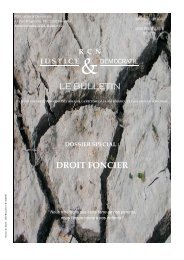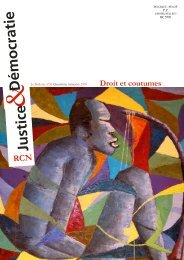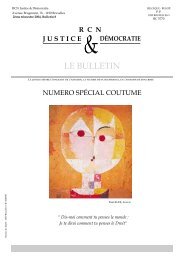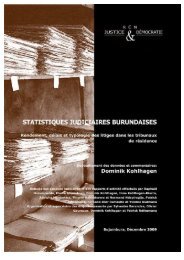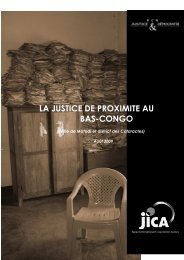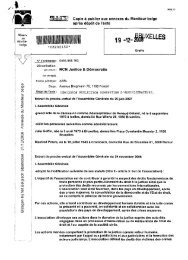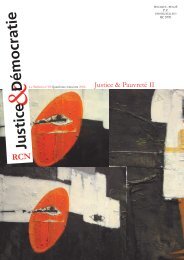Démocratie Démocratie
Extrait du Bulletin 32 - RCN Justice & Démocratie
Extrait du Bulletin 32 - RCN Justice & Démocratie
Create successful ePaper yourself
Turn your PDF publications into a flip-book with our unique Google optimized e-Paper software.
Rwanda<br />
respect for due process by the courts are few in<br />
number. The image that emerges from these trials is<br />
mixed. Whilst procedural rights are generally respected,<br />
in a not insignificant minority of cases errors<br />
were made, despite the presence of our agents;<br />
parties were not allowed to express themselves,<br />
were not treated with proper respect, or were not<br />
able to present the witnesses they want.<br />
The main recommendations that were made to the<br />
NPPA and the Supreme Court are the following. (1)<br />
The courts should consult the prosecution when<br />
scheduling trials and efforts should be made by court<br />
clerks to clearly indicate to the parties and the public<br />
in what rooms or other locations the trials that affect<br />
them will be held. (2) Prosecutors should refrain<br />
from sending incomplete files to court and, more<br />
generally, their capacity should be strengthened to<br />
make an accurate assessment of the likelihood that<br />
they will get a conviction. This should help to avoid<br />
needlessly keeping defendants in detention, needlessly<br />
keeping defendants and victims in uncertainty.<br />
In addition, it will help to avoid wasting the resources<br />
of the Judiciary and the NPPA on fruitless cases. (3)<br />
The possibility should be examined to organize trials<br />
outside the courthouse, there where the affected<br />
parties and public live. This should help to increase<br />
their involvement. As it can be expected that it would<br />
also lead to a reduction of the number of adjournments<br />
(more defendants and witnesses will be present),<br />
it should also lead to a faster pace in backlog<br />
reduction.<br />
Success Stories<br />
The following are examples of success stories in<br />
backlog reduction. Generally, there are two types of<br />
success stories: (1) concerning persons who are<br />
freed after having spent a lot of time in preventive<br />
detention on the basis of a false accusation and (2)<br />
concerning criminals who are put behind bars many<br />
years after committing their crime.<br />
One murder case we monitored attracted considerable<br />
public attention (whilst, as we saw, most trials<br />
are conducted without any members of the public<br />
present). In the summer of 1998 a dispute between<br />
M. and S. about a cow got out of hand. The case was<br />
brought before the village council, but M. was not<br />
satisfied with the decision that was taken. This was<br />
the time when members of the Interahamwe and ex-<br />
FAR infiltrated and attempted to destabilize the<br />
North-West of the country. During trial the prosecution<br />
was able to show that M. had concluded a pact<br />
with certain infiltrators to have S. killed. The victim’s<br />
wife and several family members were present and<br />
were visibly relieved that the man who had caused<br />
his death was finally condemned to serve time in<br />
prison.<br />
Another case involved the rape of a minor in the<br />
Gicumbi area, which occurred<br />
in June of 2002.<br />
The accused party, a colleague<br />
of the victim, denied<br />
ever having had intercourse<br />
with her. The<br />
girl gave birth to a baby<br />
after the event and she<br />
claimed that the man was<br />
the father. The judge ordered<br />
the prosecution to<br />
carry out a DNA expertise,<br />
which proved her<br />
story right. The man was<br />
convicted to serve 20<br />
years in prison.<br />
The third case involves<br />
‘Lady of Justice’,de Rodrigio Duran an accusation of trivialization<br />
of the genocide.<br />
Obviously, the act of trivializing the genocide is a<br />
great sin in Rwanda. But a number of national and<br />
international observers express the fear that accusations<br />
of trivialization are used as an instrument to<br />
settle other types of scores. In the case in question<br />
the court showed itself to be sufficiently objective<br />
and independent to acquit the accused for insufficient<br />
evidence. The prosecution based its case on a number<br />
of testimonies. Still, the court elaborately explained<br />
that it could not help but doubt whether a<br />
person who had lost several family members during<br />
the genocide and who had fought alongside the FPR<br />
would entertain such views. These doubts became<br />
even stronger when the defendant was able to show<br />
that the principal witness for the prosecution was the<br />
wife of a former colleague of the defendant who<br />
blamed him for the loss of his job. This case is representative<br />
for other cases concerning charges of<br />
genocide ideology (4) and trivialization of the genocide<br />
(13) that we observed as part of our monitoring<br />
process. Out of a total of 17 cases, 11 were thrown<br />
out by the courts for lack of evidence.<br />
Backlog prevention<br />
As part of the project, RCN provided technical assistance<br />
to the NPPA in the development of tools to prevent<br />
the build-up of new backlogs. This limb of the<br />
project must be understood in the following context.<br />
Despite the support we gave in backlog reduction<br />
(10,379 cases processed during the 12 months of the<br />
project) the total number of pending cases has increased,<br />
from little over 18.000 cases in 2007 to<br />
35.000 cases at the end of 2009. And however sad it<br />
is to come to this conclusion, the real impact of the<br />
work on backlog reduction – not in terms of the<br />
number of cases dealt with but in terms of strengthening<br />
the trust that victims, complainants and the<br />
public place in the legal system and increasing its<br />
deterrent effect – is quite limited. Recall that 69% of<br />
12




